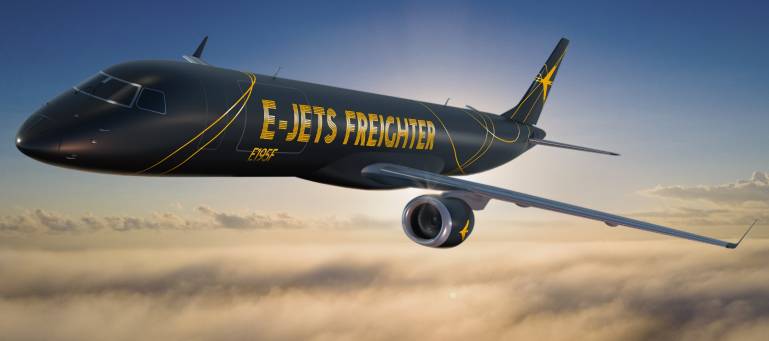SAO PAULO, BRAZIL — On March 7, the Brazilian aircraft manufacturer Embraer announced that it was entering the air freight market with the E190F and E195F Passenger to Freight Conversion programs.
The E-Jets freighter program is intended to meet the changing demands of e-commerce and modern trade that require fast deliveries and decentralized operations, the planemaker said.
With this new program, Embraer claims unbeatable cargo economics and flexibility that rightsized jets provide.
“Perfectly positioned to fill the gap in the freighter market between turboprops and larger narrowbody jets, our P2F E-Jet conversion hits the market as the demand for airfreight continues to take off, and as e-commerce and trade, in general, undergoes a global structural transformation,”
said Arjan Meijer, President and CEO Embraer Commercial Aviation.
The full freighter conversion will be available for all pre-owned E190 and E195 aircraft, with entry into service expected in early 2024. Embraer sees a market of approximately 700 aircraft over 20 years.
This initiative comes as Embraer addresses three major opportunities:
• Current small narrowbody freighter airframes are aged, inefficient, highly polluting, and well within their retirement window;
• The ongoing transformation of the intersection between commerce, trade, and logistics, has led to unprecedented demand for airfreight across the board, and more so for same-day deliveries and decentralized operations; the perfect mission for E-Jet sized freighters;
• The earlier E-Jets that entered service around 10-15 years ago are now emerging from longterm leases and beginning their replacement cycle, continuing over the coming decade.
The full cargo conversion will extend the life of the most mature E-Jets by another 10 to 15 years, and encourage their replacement with more efficient, more sustainable, and quieter aircraft.
According to manufacturer, the E-Jet Freighter will have over 50% more volume capacity, three times the range of large cargo turboprops, and up to 30% lower operating costs than narrowbodies.
“The E-Jet air freighters will provide fast, reliable, and cost-effective service to freight forwarders, extend the revenue earning life of E-Jets, support E-Jets’ asset values, and create a strong business case encouraging the replacement of earlier aircraft with modern, more efficient, passenger aircraft,”
said Johann Bordais, President & CEO, Embraer Services and Support.
“With more than 1,600 E-Jets delivered globally, customers of this new freighter segment will benefit from well established, mature, global services network, in addition to a comprehensive portfolio of products ready to support their operation from day one.”
The conversion to freighter will be performed at Embraer’s facilities in Brazil and will include, main deck front cargo door; cargo handling system; floor reinforcement; Rigid Cargo Barrier (RCB) – 9G Barrier with access door; cargo smoke detection system, including class “E” extinguishers in upper cargo compartment; Air Management System changes (cooling, pressurization, etc); interior removal and provisions for hazardous material transportation.
The E190F will be able to handle a payload of 23,600lb (10,700kg) while the E195F a payload of 27,100 lb (12,300 kg).

